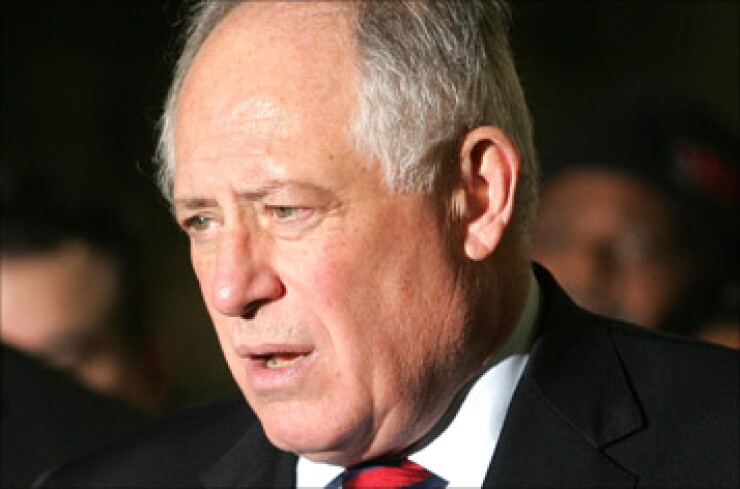
CHICAGO — With Ill. Gov. Pat Quinn, Chicago, other local governments, and bond investors all clamoring for action on the state's unfunded pension obligations, the General Assembly convened its brief annual veto session Tuesday with little indication that it is ready to tackle the issue.
Quinn on Tuesday countered recent comments from the state senate president that questioned whether the state's pension woes represent an immediate "crisis." Quinn called the state's unfunded pension liabilities an "extreme emergency."
A legislative conference committee has been hashing out a new overhaul plan aimed at breaking the political logjam, but Democratic and Republican members have struggled to reach agreement. State Senate President John Cullerton, D-Chicago, recently said the General Assembly could act on a plan if sufficient support is found without the formal release and approval of a plan by the conference committee.
Action is needed soon, if not during the veto session, if the state hopes to avoid any further credit deterioration. Inaction on an overhaul of its pension system, which is burdened with $95 billion of unfunded liabilitie,s drove two fresh downgrades this spring, adding to the steady downward slope of the state's general obligation rating. It's now the poorest rating among states at the low-single-A level. The three major rating agencies all assign a negative outlook.
Investors demand steep penalties on Illinois paper. The state's 10-year GO maturity in a June sale carried an interest rate of 164 basis points over the triple-A benchmark for comparable maturities. The spread was 141 basis points on a spring sale. In secondary market trading, market participants said the penalties have ranged from 170 basis points to 190 basis points in recent weeks. Quinn put a price tag of $130 million on the penalty paid by the state to borrow in June due to its credit deterioration over the last few years.
Illinois' public universities have seen their ratings slide over exposure to the state's woes resulting in higher borrowing costs. Chicago, Cook County, and several other city sister agencies have also suffered downgrades and interest rate penalties as they await state approved pension reforms for their own struggling funds.
During the summer, Quinn attempted to pressure lawmakers to act by vetoing their legislative pay in the new fiscal 2014 budget, but Cullerton and House Speaker Michael Madigan, D-Chicago, challenged the move and prevailed in a recent court ruling. The Illinois Supreme Court has agreed to take the case.
Cullerton recently downplayed the urgency of the state's pension mess, saying in a radio interview, "People really misunderstand the nature of this whole problem. Quite frankly, I don't think you can use the word 'crisis' to describe it at the state level." The pension woes must be dealt with if the state is to allow an income tax hike to expire, he said, but the state is not on the verge of insolvency over the issue.
Lawmakers have been at an impasse for two years over how to change the system. State constitutional protections have complicated the debate. The constitution grants pension benefits contractual rights that cannot be impaired or diminished, and elected officials disagree over what measures could better withstand a challenge.
Democratic members of the conference committee have outlined the framework of a plan that would limit the amount of salary used to determine benefits and eliminate the state's current automatic 3 % cost of living increase, shifting to a formula tied to inflation. Employee contributions would be cut by 1%. Supporters believe some of the changes like the contribution drop would offer employees "consideration" for the benefit cuts, improving the legislation's chances of withstanding a constitutional challenge.
The plan's proponents have estimated it would trim $138 billion off state payments over the next 30 years. That's more than one previous plan promoted by Senate Democratic leaders that would have generated just $57 billion in savings but short of a House Democratic plan that would have achieved $163 billion in savings. The range of annual savings in the state's contributions among the three plans is between $750 million and $1.5 billion. The committee' framework plan would save about $1 billion.
Republicans on the committee want further reforms such as an increase in the retirement age and the chance to shift to a 401(k) style plan. The committee, made up of Democrats and Republicans, has yet to formally announce a plan. A spokesman for Madigan has said he is awaiting a committee report.
Faced with a series of false starts on pension reforms ahead of various regular and special sessions, investors remain skeptical. "Investors would like to see reforms pass but their expectations are not necessarily high," said Alan Schankel, managing director at Janney Capital Markets.
Passage of a pension overhaul could help narrow the state's spreads by at least 20 basis points but would depend on the breadth of the changes adopted, Schankel said.
"It's better to have something done with a legal challenge ahead than to have no reform at all," he said.





